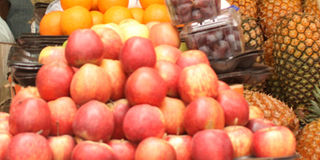Ramadhan boosts demand for fruits

Increased demand for fruits such as oranges, passion fruits, mangoes and bananas has led to an increase in prices. But for some fruits such as apples, the price has not changed. PHOTO BY FAISWAL KASIRYE
Agricultural produce such as pawpaws, yellow or sweet bananas and vegetables are always available on the market. Their prices change either when demand is high or supply is low.
Given the gradual increase in demand for fruits since Ramadhan—the Muslim month for fasting—started, the farmers have an opportunity to earn more during this season.
Specific fruits
As the Muslim fast over 30 days till mid-July, they look out for specific fruits for iftar (to break the fast) or as accompaniment to the meals later in the evening.
“By this time, prices rise because of the high demand. At my stall, customers ask for bogoya [Cavendish], sweet bananas, pawpaws and avocado. They like fruits at the time they break the fast,” notes Betty Nabukalu, a fruits dealer, at Nakasero Market.
A cluster of bogoya that was at Shs3,000 is now at Shs4,000. Sweet bananas has also increased by the same amount, from Shs3,000 to Shs4,000. The price for the latter is expected to rise to Shs8,000.
Farmers’ prices
She adds that although mangoes are the other fruits that many people like, they are not a priority to her customers. Currently, the supply of mangoes is high and hence prices have reduced.
Jane Nakagwa, a trader at Nakasero Market, also attributes the surge in prices to higher demand for especially fruits to the Ramadhan season.
However, she notes, “Sometimes , we sell products according to how we buy from the farmers on a given day. The purchase price will determine the price at which we sell.”
There has been an increase in prices at which the farmers sell. And this usually occurs when the demand for the commodity is high or when its supply is low, whatever the case may be.
A kilo of passion fruits that cost Shs5,000 last month is now at Shs6,000. The price for oranges has gone up from Shs6,000 to Shs7,000 per kilo.
A tin of grapes is Shs9,000 from Shs7,500 but is expected to continue rising to Shs10,000. A kilo of tomatoes rose from Shs2,500 to Shs3,000 and is now at Shs4,000. By the end of Ramadhan, a kilo of onions is expected to be at Shs6,000 from Shs4,000.
Rise in prices
However, the price for apples will remain constant at Shs1,000 each. Water melons currently retail at at Shs6,000 from Shs3,000. The price is expected to rise up to Shs10,000 towards or at the end of Ramadhan as the supply reduces.
The other agricultural products whose prices are expected to rise at the end of the season include irish potatoes, matooke and rice. Abdu Kitata, a water melon dealer, believes this could be the case.
Increased demand
In the same vein, Shakirah Nakalule, a vegetable seller, explains that it is not only fruit farmers that will gain from the fasting season.
This is because there is an increased demand for vegetables as well.
Apart from tomatoes which are at Shs2,000 a kilo, the prices for other vegetables like carrots, green pepper, cucumber, onions and egg plants have increased by Shs1,000.
A kilo of carrots has risen from Shs4,000 to Shs5,000. A kilo of green pepper from Shs3,000 to Shs4,000. A kilo of cucumber rose from Shs2,000 to Shs3,000 and is at Shs5,000 now. A kilo of onions from Shs4,000 to Shs5,000 the same for a kilo of eggplants—from Shs4,000 to Shs5,000.
An impact
Besides the Ramadhan season, another factor that Nakalule points out is the weather conditions.
“The supply of most commodities increases towards the end of the rainy season because it is when farmers harvest their produce,” she predicts.
It is worth noting that the coincidence of both periods occuring about the same time has a significant impact on the behaviour of prices in the market.




